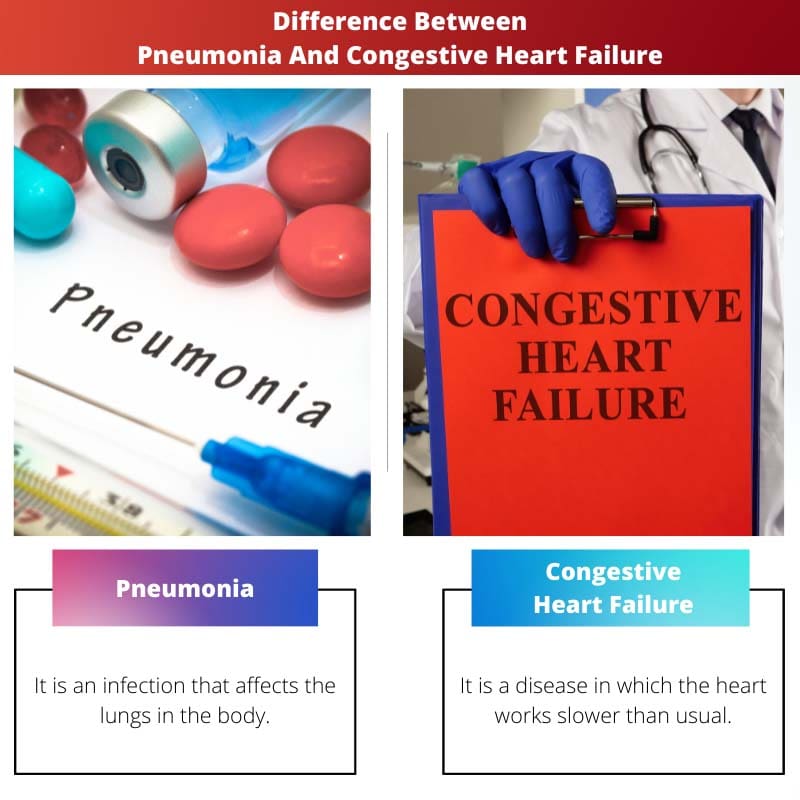Pneumonia and Congestive heart failure are two very different medical conditions that happen to two different organs of the body.
Some symptoms of them are similar and therefore it can be confusing to tell what it is before the tests. Though the tests can report what it is.
The differences between the two terms are mentioned below.
Key Takeaways
- Pneumonia is a lung infection caused by bacteria, viruses, or fungi, leading to inflammation and fluid buildup in the lungs.
- Congestive heart failure is a chronic condition in which the heart fails to pump blood efficiently, causing fluid retention and shortness of breath.
- Both conditions can present similar symptoms, but pneumonia is primarily a respiratory infection, while congestive heart failure is a cardiovascular issue.
Pneumonia vs Congestive Heart Failure
Pneumonia is an infection of the lungs, caused by bacteria, viruses, or fungi. Congestive heart failure is when the heart cannot pump enough blood to meet the body’s needs. This can cause symptoms such as shortness of breath, fatigue, and swelling in the legs and ankles.

Pneumonia is an infection because which the air sacs of our lungs get filled with fluid. This affects our breathing, it becomes heavier and chest pain can occur as well.
Also, this causes cough or phlegm. A variety of bacteria or viruses can cause pneumonia.
Congestive Heart failure can occur because of many conditions like high blood pressure, thyroid, diabetes, etc. In heart failure, the heart works slower than normal.
It pumps blood slower and works less efficiently due to which the body’s blood flow is compromised. The other organs didn’t get enough nutrients and oxygen.
Comparison Table
| Parameters of Comparison | Pneumonia | Congestive Heart Failure |
|---|---|---|
| Definition | It is an infection that affects the lungs in the body. | It is a disease in which the heart works slower than usual. |
| Cause | The causes are insanitation, bacteria, fungi, or a virus. | Congenital heart disease, kidney disease, Arrhythmia, diabetes, high blood pressure, high cholesterol levels, smoking are some of the causes. |
| Symptoms | Chest pain, fatigue, weakness, high fever, cough, etc. | Chest pain, difficulty in breathing, weakness, fatigue, weight gain, etc. |
| Diagnosis | Blood tests, chest X-rays, CT scans, etc. | Blood tests, ECG, Chest X-ray, MRI, Ejection fraction, stress test, MUGA scan, etc. |
| Treatment | Prescribed antibiotics, pain relievers, and cough syrups. | Healthy diet, limiting fluid intake, prescribed medication, rest, etc. |
What is Pneumonia?
Pneumonia is an infection due to which the lungs of the body get affected. It inflames the air sacs in our lungs, which leads to breathing problems.
The air sacs get filled with liquid, that why the patient experiences chest pain, cough, chills, and fever.
The main cause of catching pneumonia is bacteria, fungi, or a virus. Insanitation causes viruses and bacteria, and therefore, people going to unhealthy areas catch pneumonia easily.
The risk of pneumonia is higher for very young children, such as newborns and older people above 60. Also, people with a lower immune system or having any other disease already are at higher risk.
Pneumonia can be severe if not handled with proper medical attention, and it can be life-threatening. It causes breathing problems and can cause stress to the heart, leading to heart failure.
You can prevent the risk of pneumonia by staying healthy and sanitated. Also, vaccinations are available to prevent pneumonia.
Blood tests, chest X-rays, CT scans, etc., are done to diagnose the infection. Pneumonia is a very common infection, almost 10 million cases show up every year.
Antibiotics, pain relievers, and cough syrups are used to treat the infection if severe hospitalisation is needed.

What is Congestive Heart Failure?
Congestive heart failure is a disease that affects the working of our hearts. The heart slows down and works less efficiently than it used to.
This leads to not pumping of blood at the normal rate, and so the blood flow in the body is compromised.
This affects other organs of the body, and so the patient experiences chest pain, difficulty in breathing, weakness, fatigue, weight gain, and difficulty in concentrating.
Heart failure can be caused because of many heart conditions like suffering from a heart attack, congenital heart disease, kidney disease, Arrhythmia, diabetes, high blood pressure, high cholesterol levels, smoking or by drugs taken while chemotherapy, etc.
It is a serious and common disease.
Blood tests, ECG, Chest X-ray, MRI, Ejection fraction, stress test, MUGA scan, etc., are done to diagnose heart failure.
And its treatment includes a healthy diet, limiting fluid intake, prescribed medication, rest, and sometimes a pacemaker is also implanted in the patient’s body.
There are four stages of heart failure: Stages A, B, C, and D. These four show different symptoms and require different medications.
Stage D is the last stage in which heart failure can be treated, but you cannot get fully cured.

Main Differences Between Pneumonia And Congestive Heart Failure
- Pneumonia is an infection. Congestive heart failure is a disease.
- Viruses or bacteria cause pneumonia. Any heart condition like a heart attack causes congestive heart failure.
- Pneumonia affects the lungs, and the air sacs fill with fluid. Congestive heart failure affects the heart rate, it slows it down, and the heart starts working slower than normal.
- A person can get fully cured in case of pneumonia. However, heart failure can only be managed, and it cannot be fully cured.
- Pneumonia can lead to heart failure, though heart failure cannot lead to pneumonia.




